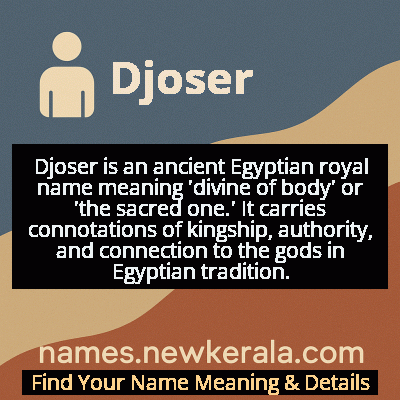Djoser Name Meaning & Details
Origin, Popularity, Numerology Analysis & Name Meaning of Djoser
Discover the origin, meaning, and cultural significance of the name DJOSER. Delve into its historical roots and explore the lasting impact it has had on communities and traditions.
Name
Djoser
Gender
Male
Origin
Egyptian
Lucky Number
8
Meaning of the Name - Djoser
Djoser is an ancient Egyptian royal name meaning 'divine of body' or 'the sacred one.' It carries connotations of kingship, authority, and connection to the gods in Egyptian tradition.
Djoser - Complete Numerology Analysis
Your Numerology Number
Based on Pythagorean Numerology System
Ruling Planet
Saturn
Positive Nature
Ambitious, efficient, realistic, and authoritative.
Negative Traits
Materialistic, stressed, confrontational, and can be overly ambitious.
Lucky Colours
Dark blue, black.
Lucky Days
Saturday.
Lucky Stones
Blue sapphire, amethyst.
Harmony Numbers
2, 4, 6.
Best Suited Professions
Business leaders, managers, financial services, law enforcement.
What People Like About You
Leadership, determination, organizational skills.
Famous People Named Djoser
Djoser
Pharaoh of Egypt
Commissioned the Step Pyramid at Saqqara, the world's first large-scale stone monument
Netjerikhet Djoser
Ancient Egyptian Ruler
Reigned for 19-28 years, established Memphis as capital, and was deified after death
Djoser (Famine Stela)
Legendary Pharaoh
Featured in the Famine Stela as ending a seven-year famine by building a temple to Khnum
Name Variations & International Equivalents
Click on blue names to explore their detailed meanings. Gray names with will be available soon.
Cultural & Historical Significance
The name Djoser became synonymous with innovation and divine kingship in Egyptian culture. Later generations revered him as a wise ruler and miracle-worker, as evidenced by the Famine Stela from the Ptolemaic period that credited him with ending a devastating famine. His deification in later periods demonstrates how his historical significance evolved into mythological importance, bridging the gap between mortal kingship and divine intervention in Egyptian religious thought. The name continues to symbolize the pinnacle of ancient Egyptian architectural and administrative achievement.
Extended Personality Analysis
Individuals named Djoser are typically perceived as visionary, innovative, and authoritative figures. They embody leadership qualities characterized by bold thinking and the ability to transform abstract ideas into tangible reality. Like the pharaoh who revolutionized architecture, Djoser-named individuals often display exceptional organizational skills and a forward-thinking mindset that challenges conventional boundaries. They tend to be practical visionaries who combine creative imagination with meticulous planning and execution.
Their personality often includes a strong sense of tradition balanced with revolutionary thinking. They respect established systems while seeking to improve and advance them. Djoser personalities typically exhibit determination, resilience, and the ability to inspire others to achieve monumental tasks. They are natural builders and organizers who leave lasting legacies through their work and influence. Their leadership style tends to be transformative rather than merely administrative, focusing on creating enduring structures and systems that stand the test of time.
Modern Usage & Popularity
In contemporary times, Djoser remains an extremely rare given name, primarily used by Egyptologists, historians, or parents with deep interest in ancient Egyptian culture. The name sees occasional usage in academic circles and among enthusiasts of ancient history, but it has never entered mainstream naming trends. Its usage is almost exclusively masculine and carries strong connotations of ancient authority, architectural achievement, and historical significance. The name's complexity and strong association with a specific historical figure limit its widespread adoption, making it a distinctive choice for those seeking a name with profound historical weight and unique character. It appears occasionally in historical fiction and educational contexts but remains outside conventional naming databases and popularity charts.
Symbolic & Spiritual Meanings
Symbolically, Djoser represents transformation, innovation, and the bridge between human achievement and divine inspiration. The name embodies the concept of turning vision into monumental reality, much like the Step Pyramid transformed Egyptian architecture. It symbolizes architectural genius, royal authority, and the eternal legacy of human accomplishment. Djoser also represents the synthesis of tradition and revolution—honoring past practices while radically advancing them. The name carries connotations of permanence, stability, and the human desire to create structures that transcend mortality. In a broader sense, it symbolizes the power of collaboration between visionary leadership and technical expertise, as exemplified by Djoser's partnership with his architect Imhotep, making it a name that represents both individual greatness and the power of teamwork.

